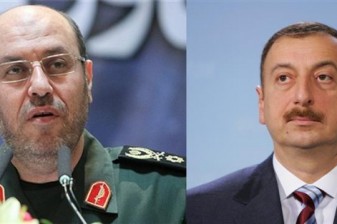
23/04/2015 09:29
Iran Offers Guns and Friendship to Azerbaijan
Iran and Azerbaijan have made a surprise decision to form a joint defense commission; a move that may indicate a conspicuous geopolitical shift in the South Caucasus. Eurasianet.org reports
During his April 20 visit to Baku, Iranian Defense Minister Hossein Dehqa proposed selling arms to Azerbaijan. The move came just as US President Barack Obama indicated that Washington would support reducing sanctions against Iran as soon as it introduces new restrictions on its nuclear program.
Azerbaijan, faced with growing tensions with Armenia over Nagorno Karabakh, has not yet indicated a willingness to buy. But Iran’s offers for military cooperation go in other directions, too.
At a press-conference on April 21, Iranian Ambassador Mohsen Pak Ayeen said the two neighbors will set up a joint mechanism to tackle defense challenges.
“There are developments in the world and in the region that have an impact on our region,” the ambassador said after Dehqan and Azerbaijani President Ilham Aliyev agreed that there is room for expanding military cooperation between their countries. “Threats coming from ISIS and al Qaeda have been discussed [by Azerbaijani and Iranian officials]. It was decided to make joint efforts to tackle religious fundamentalism,” APA reported Pak Ayeen as saying.
Iran complaining about religious fundamentalism is only one part of the surprising turn of the events. In the not too distant past, Baku was accusing Iran of attempts to export just that sort of fundamentalism to Azerbaijan, while Tehran claimed Baku was a playground for Israeli intelligence operations. Concerned by Iran's territorial claims in the Caspian Sea, Baku earlier had asked the US for advice about how to withstand any Iranian military incursion against its Caspian oil and gas structures.
Now, however, the two countries seem to be putting their deep-seated disagreements over policies on the Caspian Sea, Israel, the US, and the role of Islam behind them.
The minister cautioned against an arms race in the region and involvement of outside powers (in other words, the EU, Russia or the US), and called for local ways to face regional challenges. President Aliyev, ever balancing between East and West, was less vocal in his public comments and mainly spoke about the important role that Iran plays in the neighborhood.
Tehran’s overtures, though, may hold certain attractions for the Aliyev administration. Baku’s increasingly authoritarian ways have caused a certain chill between Azerbaijan and the West. The White House on several occasions has criticized the Aliyev administration for repression of civil society, and Baku repeatedly advised Washington to mind its own business. Arguably, that chill may be part of the reason Baku is now busy keeping its strategic options open.








